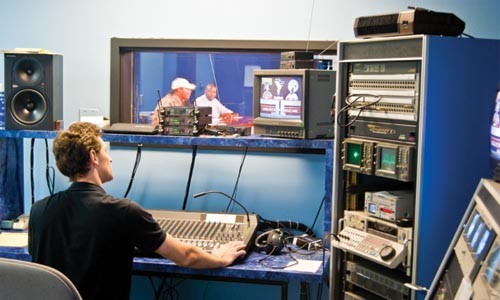
In a recent episode of Traci the Trailer Trash Girl, the host said "fuck" 131 times in 60 minutes.
Previously, she has called Pittsburgh City Council a "bunch of assholes," and discussed her preference for "8-inch dicks." She frequently shouts the phrase "poopy dirt."
"Traci" -- a.k.a. Harold Keller -- is a self-described "foul-mouthed, mean drag queen"; her mix of standup comedy and social commentary is brought to you by public-access television. In fact, two years ago she moved to Beechview, to take advantage of Pittsburgh's public-access station, PCTV, after being bounced from a station outside the city for being too offensive.
However you feel about her program, unscripted commentary delivered by a 57-year-old man in a blonde wig, black pleated dress, Mary Jane heels and smeared blue eye shadow and lipstick is protected -- to a point -- by the very nature of public access television.
Which is both the best and, arguably, the worst thing about it.
"You may not like something you hear or see, but someone else may love it and it speaks to them," says John Patterson, executive director of PCTV. "We try to be an outlet for free speech or community-relevant programs that provide some sort of value." But, he adds, those two goals "don't always mesh that easily."
Patterson, who was hired by the station in August 2009, is trying to change that.
Since he took over, he's switched the station to a "block programming" format, with 25 categories including education, history, health and lifestyle, to films and documentaries and environmental and youth programming. The format debuted in July and is meant to deliver more diverse shows and encourage producers to "really think about what they're producing." The programming grid will change every six months.
Previously, any kind of program might be on the station at any given time. Now, however, viewers can expect to see certain kinds of programming in certain time slots: religious programming on Sundays, for example, kids shows on Saturdays or commentary shows like Traci's late at night. Traci's program airs either at midnight or in the early morning hours since it's considered adult programming. The new format also helps station leaders to identify subjects that lack programming.
Prior to the block format, Patterson says, producers participated in a "senseless lottery," essentially picking out of a hat to choose a slot.
"There was no thought given to what that program was or how it might best fit in," Patterson says.
The channel also streams live online at www.pctv21.org and is working on offering shows on-demand. Patterson is also trying to obtain a second channel.
He has also sought to bulk up the programming with contributions from area cultural groups and nonprofits.
For example, Kristin Garbarino, of the Pittsburgh Public Theater, and Dave Rodkey recently started producing Theater Talk, a segment on the city's theater scene. PCTV also broadcasts cityLIVE -- a series of topical discussions hosted at the nearby New Hazlett Theater -- and airs a program sponsored by Pittsburgh Filmmakers called Pittsburgh Reframed, a series of short films about the city.
Such programming enhances the station's offerings, Patterson says: "We have the ability to produce programming, but we need content and we need people who are experts in certain areas." And there's something in it for the nonprofit groups, too.
Being on the public-access channel "certainly gives added credibility to what we're doing rather than say 'we're doing a theater show, meet us in the basement,'" Rodkey says. "We have guaranteed air time and they put the clips online.'"
Indeed, in just two episodes, Garbarino, who hosts, has interviewed impressive subjects, including Robert Miller, son of famous playwright Arthur Miller, and Ronald Allan-Lindblom, dean of Point Park University's Conservatory of Performing Arts.
Such changes are all part of what Patterson says has been a "rebirth" for the station since a new franchise agreement was negotiated between the city and the cable companies. Most money for public-access programming comes from a surcharge on cable customer bills. The city approved agreements with Verizon in September and with Comcast in June.
But for those still unhappy with the programming, Patterson invites any Pittsburgh resident or nonprofit member to come down and produce a show of their own.
At the station's North Side headquarters, "community producers" can pay a small fee to take classes on making their own programs, working alongside veteran producers on skills ranging from camerawork to film editing.
Producers like Traci say they appreciate the medium. "I just want to let out the crazy side of my personality," she says. "Any place else in the world, I'd be censored. I don't have to follow social graces on there."
The goal, says Patterson, is to offer a "point of entry for people who don't have experience" in producing shows. PCTV also gives them access to equipment and resources they probably couldn't afford otherwise. During an Aug. 18 production of Garbarino's show, for example, PCTV staff Yuriy Aleksandrov and Monica Hughes transformed a blue screen and three high chairs into a theater with a wooden stage and lighting panels. Staffers monitored audio levels, and handled lighting changes and shifting camera angles as well.
"It's really awesome to me that [individuals], without any restriction, can produce anything they like," Aleksandrov said.
Garbarino notes public access offers a way for viewers to learn about segments of the population they may normally not encounter. "It shows the community how much is going on in the theater world of Pittsburgh. The problem isn't there's not enough to cover: There's too much to cover."
That community connection, experts say, sets stations like PCTV apart from programs on the Internet or cable television. Video-hosting websites like YouTube, Vimeo and blip.tv abound on the Internet, but they don't have the ability to target those in your own community.
Public-access TV is "the closest we get to the community soapbox," notes Nancy Cornwell, professor and chair of the Department of Television-Radio at Ithaca College. Posting material online, she says, is most likely going to reach an intended audience if the producer alerts their friends or family to it.
Given that, Cornwell believes public access is "absolutely still relevant" to the media landscape.
PCTV's Patterson explains that websites like YouTube and blip.tv also can't support a half-hour or hour-long production. Further, he says, there's no guarantee new technology may stick around. At their heart, he notes, such sites and products are owned by corporations: "They could be gone in a minute. And they're there to make a profit. We're here to serve the public."














